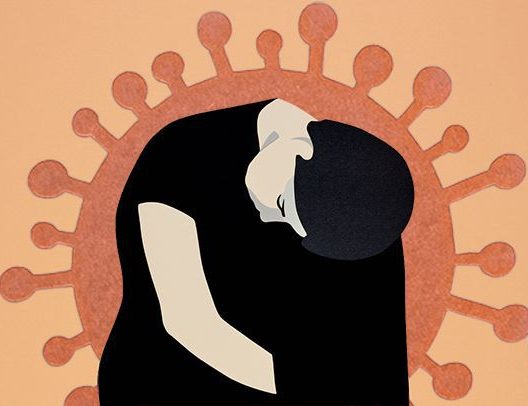How will the COVID-19 pandemic impact the future of young people today?

February 17, 2022
Picture yourself in three years. What comes to mind? Likely, if you are currently in high school, you may imagine strolling down cobbled roads on a bright autumn day on the campus of the university of your dreams. You could be starting your first job, or decorating your new apartment. You probably picture many parts of your current life, such as the level of technology, current friends or family members, and the climate where you live. However, there is likely one crucial detail missing in this fictitious life, one that has been a deciding factor in your decisions in recent months, and likely will be, consciously or not, in your future: COVID-19.
However enticing it may be to imagine a future without the effects of the pandemic, we must be consciously aware of the changes this virus can bring to our lives, particularly in the areas of mental health, careers, and beliefs and values.
Mental Health
During the pandemic, we witnessed a surge in cases of mental illnesses among teens, such as anxiety and depression. Possible causes of this increase include but are not limited to: isolation, shift from regular structure of school, fears of the virus, climate change, and political unrest. Although it may seem that with the arrival of the vaccine and openings of many public places we are slowly emerging from the pandemic, it is important to understand that the mental health effects are far from over. In fact, according to a study researching the impact of COVID-19 on the general population in the United States, “not only are the number of youth searching for help with their mental health increasing, but throughout the COVID-19 pandemic youth ages 11-17 have been more likely than any other age group to score for moderate to severe symptoms of anxiety and depression” (The State Of Mental Health In America). This means that the age group of high schoolers today is particularly vulnerable to symptoms of mental illness. However, more young people are open and willing to reach out for help. What does this mean in reference to a possible long-term impact? It is possible that teens today will carry symptoms of mental illness far into their adult lives but will be more vocal about their struggles and conscientious about how it affects one’s daily life than prior generations.
Careers
It is important to consider the impact of the pandemic on careers as it has caused one of the most noticeable lifestyle changes in the general population. One of the most important changes is the switch to working remotely, across many different careers. In fact, according to Buffer, “Overwhelmingly, remote workers would like to work remotely at least some of the time for the rest of their careers, and, just as we’ve seen in the past few years, 97 percent of remote workers would recommend remote work to others.” Due to these findings, it could be more likely for employers to offer the option of remote work and more flexible schedules. Also, this may give those entering the workforce a better chance at freedom of where they live, so location of a job may not be one of the deciding factors when choosing a career or looking for a house. However, those choosing careers at a time of remote working may not experience the community within the workplace in the same way as previous generations. To account for this, one may choose to get involved with events and organizations in the area or move to an urban setting in order to stay connected.
Beliefs and Values
One of the most defining characteristics of a generation is their beliefs and values, often resulting from shared experiences. This can be seen in those who grew up during the Great Depression in America and experienced a great scarcity of money, food, and resources. These people carried the habit of saving resources well into their adult lives, even when this practice was no longer a necessity. Similarly, there may be lasting changes in the generation growing up during the pandemic. According to Professor Kevin Morrell, “We do not need to see masks to recognize the new bedrock of every moral code: it simply involves keeping a distance. We instantly recognize and appreciate this when others move away, perhaps by walking into a now empty road to give us space. These are fundamental, unspoken changes in how we use public space yet they have happened almost overnight.” Additionally, the same article states that “Lockdown may help to cultivate a sense of civic responsibility if people can connect personal sacrifices or discomfort to the broader public good. It is a kind of discipline that tests our patience but could also strengthen it (if it doesn’t spill over into mass frustration). It could also provide a sense of perspective and restore appreciation for simple pleasures.” These possible predictions, if proved true, could create a generation more respectful of physical boundaries and considerate of public health, perhaps quicker to receive vaccines in order to help prevent another health crisis.
As the distance of time since the beginning of the pandemic to present day widens, what it means for those in their formative years becomes ever clearer. However, there is nothing for certain, and so much is yet to come. For now, it is most important to work hard and enjoy the high school years, as much as you can in a mask.
Sources
MHA Affiliate. “The State Of Mental Health In America.” ExtendaTouch, 4 Oct. 2021, extendatouch.com/blog/the-state-of-mental-health-in-america/.
Morrell, Kevin. “Values in the age of coronavirus: how a disease changed what it means to live a virtuous life.” The Conversation, 4 May 2020, theconversation.com/values-in-the-age-of-coronavirus-how-a-disease-changed-what-it-means-to-live-a-virtuous-life-136998. Accessed 17 Jan. 2022.
“The 2021 State of Remote Work.” Buffer, buffer.com/2021-state-of-remote-work. Accessed 2 Jan. 2022.

